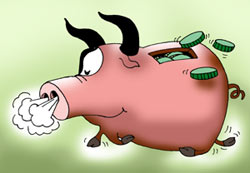 ave some spare cash languishing in your savings account, but don't want to block it in a fixed deposit or risk an investment in shares?
ave some spare cash languishing in your savings account, but don't want to block it in a fixed deposit or risk an investment in shares?
 A cash fund could be your answer.
A cash fund could be your answer.
Cash funds are known as ultra short-term bond funds or liquid funds that invest in fixed return instruments of short maturities. Their main aim is to preserve the principal and earn a modest return. So the money you invest will eventually be returned to you with a little something added.
Of course, you will not get the spectacular returns of an equity fund. But you will not face the threat of your investment being reduced to nothing.
1. Liquidity: Savings account wins
How easily can you access your money? A cash fund falls between a savings account and a fixed deposit.
If you put in a request for redemption (sell your units), the cheque will be dispatched to you the very next day.
If you opt for the Electronic Clearing System, your redemption amount will be credited to your bank account directly the next day.
The only drawback is, you do not have the instant advantage of going to an ATM and making a withdrawal.
2. Safety: Savings account wins
Cash funds are definitely not as risky as other types of mutual funds but that does not mean they are risk-free.
All mutual funds are subject to market risks and cash funds are no different. But they are relatively safer than the rest.
They are not guaranteed return products, like fixed deposits or the interest on savings bank accounts.
Though rare, you will find a few sporadic instances of funds delivering negative return in a month.
But it is highly unlikely that your principal amount will get eroded.
3. Returns: Cash funds win
Though returns are not guaranteed as in a bank deposit, there is little risk of not earning interest, since these funds invest in very short-term investments with negligible risks.
Since they came into existence, this category has provided a little more interest as compared to the short-term bank deposit.
At present, cash funds' one-year trailing return (gains over a year) is an average 4.61% -- about 1.1% more than what savings accounts offer.
4. Performance: Cash funds win
Cash funds cannot be expected to deliver large returns. However, last year, when medium-term bond funds earned around 1%, the cash funds earned 4.3%.
Cash funds managed this as they mainly invest in instruments that mature quickly. When interest rates rise, these securities do not fall as much as long-term securities do. This is why:
~ When interest rates rise, fixed income investors are hurt because their money is locked in at a lower interest rate.
~ When interest rates rise, bond prices fall because the interest rate on the bond is lower than what is being offered right now. So, fewer people want to invest in it. As the demand for the bond falls, its price falls (just like it does for shares).
This will also affect the Net Asset Value of a mutual fund that has invested in these bonds.
When should you invest in a cash fund?
Only when you have surplus money in your savings account.
Remember, this is not another investment avenue. This is just a place to park your money for short periods of time.
Don't need the money for a few weeks or a few months? Then consider such funds.
Since most funds do not charge either an entry or exit load, you really don't have much to lose.
Making the right pick
It is not easy to choose an ideal cash fund. Selection criteria on the basis of portfolio and performance are of little use here.
There could hardly be any difference between the way two cash funds invest. Also, the difference between the returns of the leaders and the laggards are a fraction of a percent. Therefore, you cannot make a decision on the basis of returns.
The pedigree of the fund manager is also not too significant here.
Hence, the only important indicator is the expense ratio since this can take away a significant chunk of the returns.
Tomorrow: What is expense ratio, and the best cash funds available!
Illustration: Uttam Ghosh






